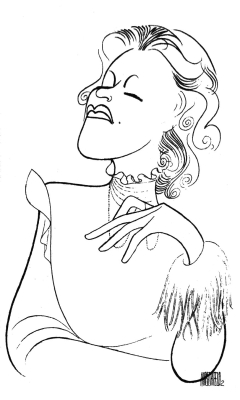In one video, a teacher was introducing a Meisner exercise, and she mentioned a device she uses to teach her students about the physicality of acting. They watch great movies on mute. The idea is that if the acting is good, you'll still be able to discern relationships, personalities, motivations, and lots more, just from the way the characters stand, sit, move, by how they enter a room, how close they get to others.
It immediately struck me how useful this would be for the women of Nine. Some of these women are well-drawn dramatic characters, some are more sketches or impressions, and they're all images inside Guido's fevered, misogynistic head. And yet, each actor has to find a reality there. Each actor has to think about how her character met Guido, what kind of a relationship they have, whether he treated her badly, what she knows about the other women, how confident she is Guido still wants her, why she's attracted to him, what she wants from him, how much of her self-worth and dignity has he stolen?
Could she be the one to tame him? To domesticate him?
And on top of that, since our story is set in 1963 Venice, Italy, these woman are likely also thinking about are they getting old, are they getting fat, are they still attractive, can they attract Guido, can they get into his movie, might they become a star like Claudia...? Or has their chance passed by...?
And for most of our actors, they have to convey all that to our audience with very little dialogue and very little solo singing. In some cases, very little onstage contact with Guido.
Even worse, for a lot of the show, many of the women are watching the action around Guido, more than taking part in it, and yet they have to stay alive in our story. They have to find a way to watch these episodes in character, to be both inside and outside our story, to convey with their reactions and body language who they are and how they relate to Guido and the other women. Some of these women have clearly had enough of Guido's bullshit, but some of them haven't reached that limit yet...
In the excellent book Training of the American Actor, Carol Rosenfeld writes about the steps acting teacher Uta Hagen devised, in the process of creating a character, things to think about and explore, and one of those steps seems extra relevant to this acting challenge for the women in our show. Here's how Rosenfeld explains Hagen's Step 3, What Are My Relationships?
How do I stand in relationship to the circumstances. the place, the objects and the other people related to my circumstances? We have a point of view, opinion or feeling about almost everything. Becoming conscious of how you stand in relationship to the circumstances and places in which you find yourself helps you make choices for the situations you create for your exercises. Circumstances may make you feel unsure of yourself, extremely self-confident or deeply disturbed. You may detest the situation you are in, or it could make you feel totally safe and protected. Circumstances can throw you off-guard, make you crazy or energize you. You may be in an environment that you know very well and that holds wonderful or sad memories. You might be somewhere that is new, strange, off-putting, cold. intimidating or foreboding. Becoming conscious of how you stand in relationship to the objects (foreign or familiar) in your surroundings, as well as your own possessions, increases your sensory and emotional connection to every object you handle. Becoming more conscious of the cast of characters in your life and how your relationships affect your behavior helps you become more honest and personal in your work.
I can see a lot of value in all of Uta Hagen's steps, but this step is particularly relevant to Nine, a whole show entirely about relationships, in which many of the characters are defined by their relationship to Guido.
In the end, it all comes down to what every contemporary acting method is ultimately aiming for, emotional honesty, acting that comes from the inside. And the key to that is knowing really well the imaginary circumstances of our story, and then living inside our story honestly. That's how our actors will give their characters and our story real life onstage. It's really just pretending. A kind of informed, prepared kind of pretending, but still just pretending.
But wait, there's more. This show Nine is unlike any other show I've worked on. I finally figured out the key to it all today. This is a fundamentally serious, dramatic story we're telling, but Guido, nine-year-old that he still is, sees it all as a comedy. So of course he loves the idea of aligning himself with Casanova, the "loveable rogue" who serially assaulted women long before we called it assault, a literary hero, who by example absolves Guido of his sins. No wonder the film Guido begins to make in Act II doesn't just use the details and women of his real life, he uses them comically. And that is his greatest sin yet, the one thing his women won't accept, a mockery of their surrender to him.
The big overall arc of our story is the process of Guido coming to terms with his life and art, and realizing that, whether or not he's a genius, he has to grow up. And the largest part of that is realizing that women -- no, that people -- are not playthings, and that using and abusing them isn't funny. It takes losing everyone for Guido to understand.
Nine is amazing. I'm so glad we get tot work on it. We are off on another rich, wonderful, exciting artistic adventure. We can't wait to share it with you.
Long Live the Musical!
Scott
P.S. To donate to New Line Theatre, click here.
P.P.S. To check out my newest musical theatre books, including my latest, He Never Did Anything Twice: Deconstructing Stephen Sondheim, click here.
P.S. To donate to New Line Theatre, click here.
P.P.S. To check out my newest musical theatre books, including my latest, He Never Did Anything Twice: Deconstructing Stephen Sondheim, click here.










0 comments:
Post a Comment